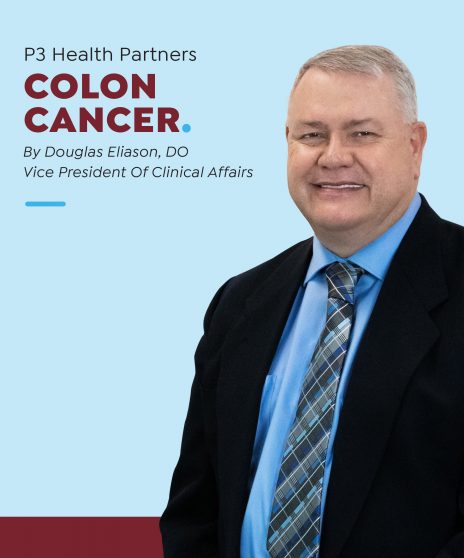Dr. Douglas Eliason, Vice President of Clinical Affairs for P3 Health Partners Oregon, shares the importance of getting a colorectal screening.
Let me start with an important fact: I am a guy.
Before I was a doctor, I was just a guy, with all the denial that can come with being a guy.
“I feel fine, I am fine. Why do I need that test? Nothing is wrong with me.”
I said those things to myself regularly until one day, I realized how wrong I was to do it.
A few years ago, a friend and patient of mine finally agreed to colon cancer screening. I had nagged him for three years and he always put it off. He finally got screened and I was happy — for the moment.
A few weeks later, his colonoscopy report came back — and they found a cancer.
Now, this was both good news and bad news; he has a cancer that does not have symptoms and is likely in its early stages. The bad news was that that cancer could have been picked up by a colonoscopy up to five years earlier and cured with removal of a polyp.
Instead, he underwent a surgery that removed six inches of colon and recovered. Thank goodness! But, it could have been worse.
Screenings are important, and so is knowing the signs of colon cancer.
According to the Centers of Disease of Control and Prevention (CDC), signs include:
- Change in bowel habits
- Blood in or on your stool (bowel movement)
- Diarrhea, constipation or feeling that the bowel does not empty all the way
- Abdominal pain, aches or cramps that don’t go away
- Losing weight and you don’t know why
You might ask yourself, “Can’t I just wait until I have symptoms and then get tested?” No.
By the time colon cancer symptoms appear, the disease is often advanced, and five-year survival rates drop dramatically.
Adults age 45 to 75 should be screened annually for colorectal cancer, according to the U.S. Preventive Services Task Force (USPSTF).
The American Cancer Society advises men at higher risk to have this conversation at age 40.
Colon cancer can be detected three ways:
- Microscopic blood in stool (fecal occult blood test): a simple, cheap test done at home.
- Stool antigen test (Cologuard): another home test but more expensive.
- Colonoscopy: only colonoscopy detects polyps at all stages of development. It is also the only “one-stop shopping “method as it allows for detection polyps, biopsy of polyps and removal polyps all in one procedure. All done while you sleep from a type of conscious sedation.
Current science tells us that all cancers of the colon start as a polyp. During a colonoscopy, polyps can be detected and removed. The challenge is to locate them, which requires screening patients who have no symptoms.
This is the crowd that says, “I’m fine, nothing’s wrong with me.” In fact, anyone over the age of 50 may have cancer seeds (polyps) brewing inside of them.
We know that denial does not work, that polyps never go away. Denial is mentality is an ineffective strategy to deal with the fourth most common cancer.
So don’t deny – and don’t delay. Talk to your provider to determine when to get screened, which test is right for you and how often you should be getting screened. You’ll rest easier.
Looking for a primary care provider? Schedule an appointment here.


